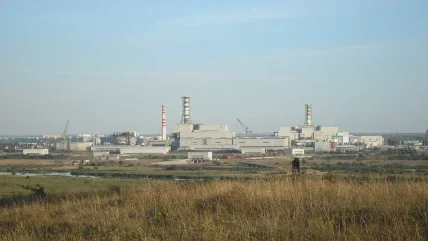
Russia’s Kursk NPP has sent the first batch of cobalt-60 (Co-60) for shipment to the customer. The material was transported in specialised containers to a redistribution centre for delivery to the customer. The shipment is enough to sterilise at least 15,000 cubic metres of medical devices.
Kursk NPP embarked on Co-60 production in 2018. After developing the appropriate safety justifications and obtaining the regulatory permits, 27 rods of additional cobalt absorbers were loaded into unit 4. And since 2022, absorbers have also been loaded into unit 3, which will double production of cobalt-60. Each additional absorber is 144 capsules of nickel-plated natural cobalt-59, which in a reactor under the influence of neutrons is transformed into cobalt-60. Cobalt-60 production at the Kursk NPP has been contracted for the entire period of operation of units 3&4.
“The ability to produce isotopes in channel reactors [RBMKs] shows that nuclear benefits people not only as for energy production,” said Kursk NPP Director Alexander Uvakin. “The resulting cobalt-60 is used in the production of gamma radiation sources. These closed sources, used in research and commercial irradiation gamma plants, have high commercial value and sustainable demand and are widely used in many countries of the world. The development of cobalt-60 in the RBMK-1000 reactor is an activity that is regulated and licensed by the Federal Service for Ecological, Technological & Nuclear Supervision. All work is carried out ensuring a high level of nuclear and radiation safety.”
The head of the Design Office for the Development of the Isotope Business at nuclear utility Regenerator, Arthur Miskov, noted: “Today, Rosenergoatom provides more than 20% of the world consumption of cobalt-60, used to sterilise medical devices, disinfect food and modify materials. Thanks to shipments from the Kursk NPP, Leningrad NPP and Smolensk NPP, Rosenergoatom Concern plans to achieve a 30% share of the world market this year.”
In addition to the production of cobalt-60, work is underway at the Kursk NPP to develop production of other medical isotopes – iodine-131, iodine-125, samaria-153, molybdenum-99 and lutetia-177 – used in the diagnosis and treatment of cancer.
Kursk NPP has four RBMK units that began operation in 1976, 1979, 1983 and 1985. In 1994-2009 they all underwent extensive technical modernisation, as did the RBMK units at Smolensk and Leningrad, in the wake of the Chernobyl accident. Kursk 1 was closed in 2021 after 45 years of service and unit 2 is due to close in 2024. They are being replaced by the Kursk-II NPP nearby where two units with new generation VVER-TOI reactors are under construction.
Image: The Kursk NPP has shipped its first batch of cobalt-60 isotope (courtesy of Rosatom)






